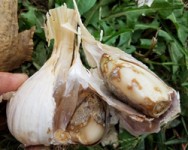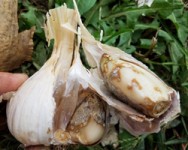Fusarium Diseases of Garlic: Research Updates and Virtual Listening Session
Fusarium diseases of garlic are ubiquitous, stubborn, and sometimes surprising or devastating.
Please join Cornell Researchers and Extension Allium Specialists for updates on current research findings and to direct future research on Fusarium diseases of garlic. Cornell presenters include Crystal Stewart-Courtens, Frank Hay and Christy Hoepting with special guest Alicyn Smart from the University of Maine.
This program is offered on Tuesday, February 20 at two different times. Duplicate programs, different times. Register to receive the Zoom link to the session of your choice.
Event Details
Date
February 20, 2024
Time
9:00 am - 10:30 am EST
Location
online via Zoom
Cost
FREE!
Host
Cornell Vegetable ProgramChristy Hoepting
585-721-6953
email Christy Hoepting
Virtual Morning Session

Fusarium diseases of garlic are ubiquitous, stubborn, and sometimes surprising or devastating.
Please join Cornell Researchers and Extension Allium Specialists for updates on current research findings and to direct future research on Fusarium diseases of garlic. Cornell presenters include Crystal Stewart-Courtens, Frank Hay and Christy Hoepting with special guest Alicyn Smart from the University of Maine.
Morning Session AGENDA:
9:00 AM: Welcome, purpose of meeting, practice questions for audience response (grower demographics) Christy Hoepting, CCE Cornell Vegetable Program
9:05 AM: Fusarium species associated with clove rot in garlic in New York and review of Fusarium disease life cycle, Frank Hay, Cornell AgriTech
9:15 AM: Evaluation of OMRI products for control of Fusarium in garlic, Frank Hay
9:20 AM: Post-harvest practices garlic competition: And the winner is… Christy Hoepting
9:25 AM: Research update on Fusarium diseases of garlic from Maine, Alicyn Smart, University of Maine
9:50 AM: Fusarium chases Eriophyid mites and progress towards managing E. mites, Crystal Stewart-Courtens, CCE Eastern NY Commercial Horticulture Program
9:55 AM: Garlic Fusarium diseases listening session: Describing the New York situation and make a wish list for resources and research projects -- University researchers from across the nation are preparing to launch a massive effort to demystify this tricky disease of Alliums with the ultimate goal of developing effective management strategies. Cornell is pleased to be a part of this USDA planning grant.
10:30 AM: Finished, except for those who want to stay to further discuss
REGISTRATION:
You must pre-register to receive the Zoom link. REGISTER for the morning session via Zoom.
Event Details
Date
February 20, 2024
Time
6:30 pm - 8:00 pm EST
Location
online via Zoom
Host
Cornell Vegetable ProgramChristy Hoepting
585-721-6953
email Christy Hoepting
Virtual Evening Session

Fusarium diseases of garlic are ubiquitous, stubborn, and sometimes surprising or devastating.
Please join Cornell Researchers and Extension Allium Specialists for updates on current research findings and to direct future research on Fusarium diseases of garlic. Cornell presenters include Crystal Stewart-Courtens, Frank Hay and Christy Hoepting with special guest Alicyn Smart from the University of Maine.
Evening Session AGENDA:
6:30 PM: Welcome, purpose of meeting, practice questions for audience response (grower demographics) Christy Hoepting, CCE Cornell Vegetable Program
6:35 PM: Fusarium species associated with clove rot in garlic in New York and review of Fusarium disease life cycle, Frank Hay, Cornell AgriTech
6:45 PM: Evaluation of OMRI products for control of Fusarium in garlic, Frank Hay
6:50 PM: Post-harvest practices garlic competition: And the winner is… Christy Hoepting
6:55 PM: Research update on Fusarium diseases of garlic from Maine, Alicyn Smart, University of Maine
7:20 PM: Fusarium chases Eriophyid mites and progress towards managing E. mites, Crystal Stewart-Courtens, CCE Eastern NY Commercial Horticulture Program
7:25 PM: Garlic Fusarium diseases listening session: Describing the New York situation and make a wish list for resources and research projects -- University researchers from across the nation are preparing to launch a massive effort to demystify this tricky disease of Alliums with the ultimate goal of developing effective management strategies. Cornell is pleased to be a part of this USDA planning grant.
8:00 PM: Finished, except for those who want to stay to further discuss
REGISTRATION:
You must pre-register to receive the Zoom link. REGISTER for the evening session via Zoom.

Upcoming Events
African Eggplant Participatory Breeding Kick-Off
March 5, 2026
Join us to learn about the Cornell African Eggplant Research Project and learn how you can participate! African eggplant, also known as Bitterball, Garden Egg, Kittley and other names, is an important crop for many members of our community with heritage from regions such as sub-Saharan Africa, Southeast Asia, and Brazil. Since 2024, the Cornell African Eggplant Research Project has been collaborating with growers and community partners across New York to develop high-quality varieties adapted to the Northeast U.S. In this meeting, we will share information about growing and preparing African eggplant, highlight our research to date, and invite partners to collaborate with us in our 2026 participatory breeding and variety selection efforts.
COST: FREE! You must pre-register to receive the Zoom link.
Managing the Invasive Swede Midge Webinar
March 6, 2026
Swede midge is an invasive fly that causes serious economic losses to brassica crops. Due to its small size and hidden feeding habits, swede midge is often called an "invisible pest" and damage may be misdiagnosed. In this webinar, we will review the swede midge life cycle and crop damage symptoms, current management recommendations, new research findings, and highlights from on-farm case studies with a focus on organic management.
1.75 DEC pesticide recertification credits in categories 1a, 10, and 23.
Good Agricultural Practices (GAPs) Food Safety Training
March 10, 2026
Newark, NY
Learn about food safety on the farm! This event hosted by the Cornell Vegetable Program, Cornell Lake Ontario Fruit Team, CCE Wayne County, and the NYS Department of Agriculture, will cover good agricultural practices (GAPs) to help reduce the risk of microbial contamination on the farm, keeping food and consumers safe.


































